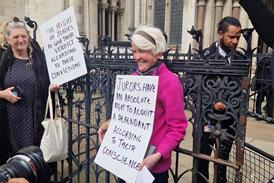A former director of business development at magic circle firm Linklaters has undertaken not to disclose information that had been subject to a court order and to destroy ’various documents’, the High Court heard this morning. The revelation appears in a short judgment in Linklaters LLP v Frank Mellish in which Mr Justice Warby notes that the ligitation has come to an end by agreement.
Today’s judgment appears to conclude an action in which Linklaters sought to prevent Frank Mellish, who left Linklaters in January, from giving interviews about three matters. In a public judgment earlier this month Warby J set out his reasons for granting an interim injunction over the material, which according to the judgment concerned what Mellish called ’the ongoing struggle Linklaters has with women in the workplace’.
The injunction was extended on 11 February.
In today’s judgment, Warby J reveals that the parties have agreed a Tomlin order by which all further proceedings are stayed on terms that he describes as ‘simple and straightforward’. These involved an agreement by Mellish to provide and abide by signed undertakings not to disclose ‘specified kinds of information’. Mellish has also agreed to destroy material defined as ‘confidential documents’ and ’to instruct others to whom he had passed any such documents to do the same’.
The schedule setting out what information Mellish has agreed not to disclose remains confidential. ’That was obviously appropriate, indeed necessary,’ Warby J said.
The parties agreed that there should be no order as to costs.
In a statement, Linklaters said: 'We can confirm that the court has approved an order reached by agreement which, in effect, makes the previous order final and brings these proceedings to an end. We did not take the decision to apply for an injunction lightly. We have a strong, supportive workplace culture and everyone working with us should be able to rely on information shared confidentially with the firm remaining confidential.'


















![David Lester (senior partner at Blythe Liggins), Darryl Barnes, Jagdeep Sandher (head of dispute resolution at Blythe Liggins)[4]](https://d1d8vslyhr7rdg.cloudfront.net/Pictures/274x183/4/2/8/116428_davidlesterseniorpartneratblytheligginsdarrylbarnesjagdeepsandherheadofdisputeresolutionatblytheliggins4_981603_crop.jpg)




